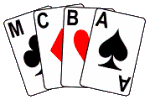 |
Manchester
County Bridge Association |
 |
|
A History of Manchester Bridge
The following article was written by Rodney Lighton based on
personal memory from about 1970 and research before and
after that date. I may have missed out important
events and personalities, or made mistakes. Do not be
offended, e-mail me with your views and corrections.
The beauty of publishing anything on the web is that it can
be changed easily.
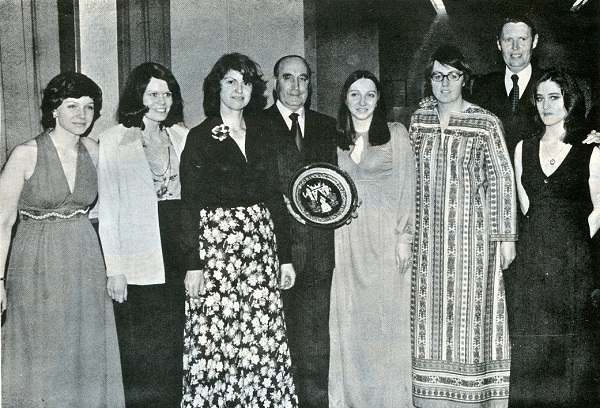 Common Market Event 1977 Ostend. The first international Gold Medals for Manchester players. Nicola Gardener, Pat Davies, Sally Carpenter, Rosie Hudson, Sandra Landy, Michelle Brunner Charles Bowman (npc) Pre-war Duplicate bridge was established in Manchester before the war, with the Manchester League and Infirmary Cup being competed for in 1938. Manchester was an area of the North Western Contract Bridge Association, which was one of the original counties forming the English Bridge Union in 1936. The first organised event in Manchester that I can find record of is a match between the British Bridge World team and a Manchester team in 1933, unfortunately the names of the Manchester players were not reported. A heat of the National Pairs was held in May 1934 and in October 1934 the Northern Bridge Club was started by Miss Annette Sinclair, a professional bridge teacher. Two matches against other cities were held in 1934. A more significant event was announced in the January 1935 issue of the British Bridge World - the opening of the Central Bridge Club by Mrs Lovell (Lobel) and Miss Greaves. Central Bridge Club was the forerunner of the Manchester Bridge Club. The first National win for a Manchester team was the Hubert Phillips Bowl in 1939 won by Joe Lazarus and Ben Franks with Alan Manch (later Dr Alan Manch who became a well known London rubber bridge player and bridge correspondent) and Mrs B. Lobel (the secretary of Central Bridge Club). 1945-1967 Organised bridge started again in 1946 and the Manchester Area was reconstituted, with Henry Huggill (Manchesterís President until 2003) being the last surviving member of the original committee when he died in 2004. In 1948 the Manchester team of Ben Franks, Sam Blaser, Joe Lazarus and Sonny Morris reached, but lost, the Gold Cup Final. In 1949 Franks and Blaser played for England against Wales in the Camrose Trophy. Both these matches were played in Manchester at city centre hotels and attracted several hundred spectators. The league re-started in 1948, although with a restricted number of teams because of petrol rationing, and the Infirmary Cup in 1950. In 1952 the Manchester Pairs competition started, with the first winner being Ziggy Schneider, a name still associated by many Manchester players as being synonymous with a show up squeeze. The Manchester Teams event started in 1954. Jack Nunes and Phil Topley were Manchester's first Gold Cup winners in 1955 playing with a London pair. Both left the area in the 1950s, Jack Nunes going to London and Phil Topley moving to Staffordshire. "In the late 1940's and early 1950's Joe Lazarus in partnership with Isaac (Sonny) Morris together with Ben Franks and Sam Blaser won every event of Local and County significance in the North of England. National success eluded them until they changed partners (in 1956) so that Lazarus partnered Franks and Morris partnered Blaser. The change worked wonders and the quartet (with the addition of Frank Farrington) burst into the national bridge scene". 1 Lazarus and Franks won the National Pairs, the team won Crockford's in 1958, having lost the 1957 final on a split tie and both pairs played in the Camrose Trophy. Their greatest success was in 1959 when they eventually won the Gold Cup (beating Reese in the final) having lost the 1957 semi-final to Reese and the 1958 final, on both occasions leading into the final set. This is the only time that a wholly Manchester team has won the Gold Cup. Lazarus and Franks were also selected for the British team in the European Championships that year and, according to Reeseís autobiography and other contemporary accounts, they were Britainís outstanding pair with Lazarus the best player, the team finishing third. "Joe's (Lazarus) hallmark at the bridge table was to make as few mistakes as possible. His forte constant care and attention to detail. Nothing at the table would escape his careful consideration and his partners and team-mates were subject to a rigorous check after each match. He was an excellent and conscientious team captain and was a model of propriety and courtesy at the table." 1 "Once Franks and Lazarus got together having switched their partnerships they were a great pair but I feel no longer young. They rivalled Reese-Schapiro. I don't think they seriously tried to play again in a European - I imagine that they got the frozen treatment from the London crowd as was typical in those days - but also Franks never looked well." 2 (Joe Lazarus retired from tournament play because his wife was ill, Ben Franks died aged 58 in 1963 after a long illness) 3 . The Gold Cup Team of 1959 played in the 1960 competition but were knocked out in an early round by Grattan Endicott's Liverpool team (Lazarus not playing because of his wife's illness), they don't seem to have played again after that as a team. The magnificent Ben Franks Trophy was purchased by the Manchester Association and Joe Lazarus for NWCBA pairs in memory of Ben Franks. "Ben Franks was the strongest player in this team - a real natural". 3 (See problem page number 7 for a fine defence by Lazarus-Franks). Reproduced, by permission of Bridge Magazine, are the editorial and Gold Cup Final report from the 1959 July-August edition of Bridge Magazine. These articles are copyright of Bridge Magazine. Note that the IMP scale in use at that date was approximately two-thirds that of the current IMP scale. Editorial Final Report Page 1, Page 2, Page 3, Page 4, Page 5, Page 6, Page 7, Page 8 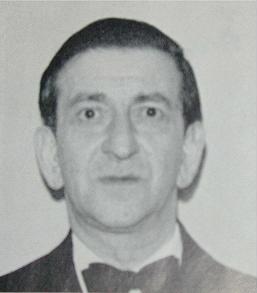
Ben
Franks
British and English International Gold Cup, Crockford's, Hubert Phillips, Tollemache and National Pair's Winner 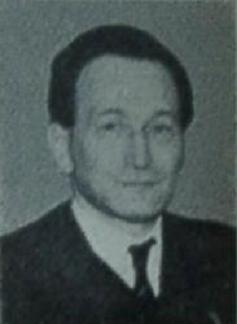
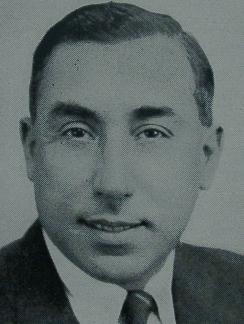
Sam Blaser Sonny Morris English Internationals Gold Cup and Crockford's Winners 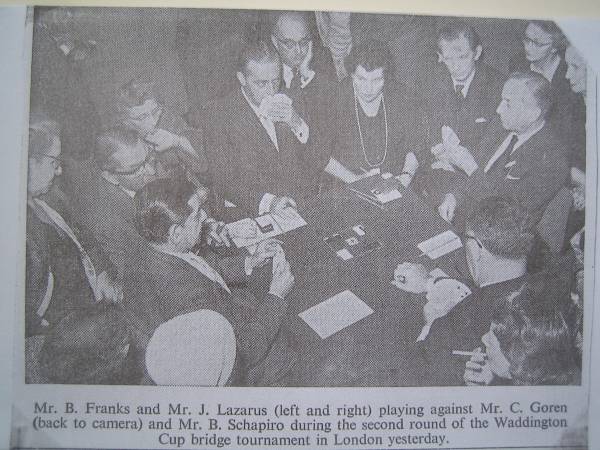 The newspaper photo shown above is taken from the Times of 15th February 1960. The photo is from an important invitation tournament of that year. Thanks to David Franks, son of Ben Franks. The
other major partnership of this era was Danny and Reuben
Myers. They won the National Pairs in 1957 and played
for England in the Camrose, they went on to represent England
in the Camrose five times in all, their last cap being in
1970. They were the most capped Manchester pair until
2003.
In 1961 (after Lazarus and Franks had retired from tournament bridge) the team of Sam Blaser, Isaac Morris with John Meizis and Frank Farrington (of Bolton) won Crockford's again. Roy Higson and Raymond Brock won the National Pairs in 1960 and 1961, Brock being one of the youngest players to win this title. They also represented England in Camrose matches, before Roy gave up playing seriously to concentrate on tournament directing. Around this time Whalley Range Bridge Club was the main duplicate club in the city. The organisation of bridge in the area was mainly in the hands of the Higson family, Roy from 1958-63 and Mary from 1963-71. They ran all the tournaments and league and cup, practically a full time job. Mary continued as tournament secretary until 1999. Mary was a good enough player to win many congress events and the Manchester League. Mary
Higson
- at the Roy Higson Cup Final 2002
In
1965, Reuben and Danny Myers, together with Maurice Blank,
Monty Lipworth, Norman Choularton and Brian Hargreaves won the
Crockfordís Cup, this was to be the last success in a major
knock out competition for Manchester players for nearly twenty
years. This competition had one of the strangest final
boards ever. The Manchester team had apparently lost
after they had bid a slam in a suit missing the AK of an
outside suit (clubs). The opponents had played this hand
in 6NT, which made because the opposing clubs were 6-1
with a singleton king. The Manchester team's slam went
off after ace of clubs and a ruff. However, the board
had been rotated through 180 degrees at some point and had to
be replayed.
1968-1986 In 1968 the Central Bridge Club was bought by Peter Ader and he appointed Paul Hackett to run it. Paulís dynamic approach and organisational skills soon made Central the most important club; Whalley Range declined and closed several years later. A highlight of Paul's time at Central was the visit to Manchester of the famous Italian Blue Team in 1972. In the late sixties and early seventies Manchester University saw an influx of very strong players, many of whom still have a great influence on the game in the area. Peter Watson, Alan and Rosie Hudson, Boris Ewart, Robert Ferrari, John Holland, Michelle Brunner, Gary Hyett, Steve Eginton, Barry Myers and Alan Mould amongst others studied at the University and while their exam results were not always wonderful, their bridge playing flourished. A great mentor for these players was Frank Wood, a stalwart of the rubber bridge school at Central Bridge club. The Manchester league, which was always successful, reached its zenith in 1976 with almost 150 teams taking part. It is still thriving, but numbers are down to around 65 teams these days. Schools' bridge leagues and one day events were run throughout the seventies, but died out after then. Paul Hackett and wife Olivia produced twin boys in 1970, Jason and Justin, who inevitably grew up to be bridge players. Paul left Central Bridge Club in 1973. After a brief period with Roy and Mary Higson in charge, Jeff Morris arrived in Manchester to run the club. In 1978 Peter Ader died and Jeff Morris moved the club to its present (much larger) premises on Palatine Road, where it became the Manchester Bridge Club and the leading venue for bridge in Manchester. Roy Higson went on to be the chief tournament director for the EBU for many years. Bernard Goldenfield, one of Manchesterís strongest players married Rhona in 1975 and they became one of Manchesterís leading pairs, a partnership that played with great success until Bernard's death at the age of 86 in 2019. In the late 1970s and 1980s the dominant team was Michelle Brunnerís Isolated Menaces with numerous wins in the league and Infirmary Cup. Ever present in this team were Michelle Brunner, John Holland and Gary Hyett, with Alan Mould joining the team in the late 1980s and various other ex-university players, notably Boris Ewart, participating. 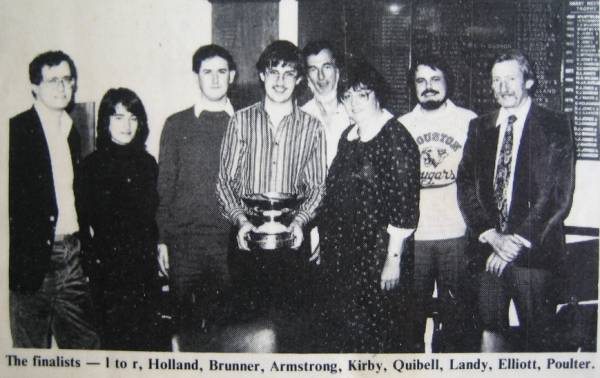 The 1983 Hubert Phillips Finalists
Michelle Brunner and John Holland together with Graham Kirby
and John Armstrong of Merseyside won the Hubert Phillips mixed
teams five times in nine years in the 1980s to early 1990s.
Of the major knock out teams, the Hubert Phillips has been Manchester's best event. Since 1983, Manchester teams have won nine times, with Michelle Brunner, John Holland and team mates recording six wins; Rhona and Bernard Goldenfield, John Hassett and team mates recording three wins, to go with the 1939 win for Ben Franks' team. 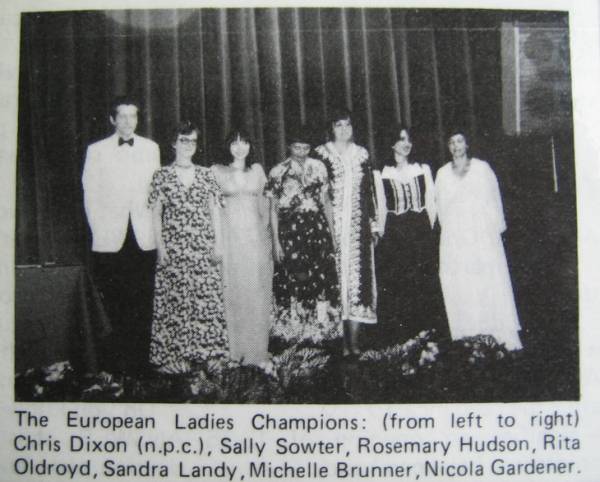 Manchester's first ever European Gold Medals for Michelle and Rosie in 1979
Michelle Brunner achieved great success in the Womenís game,
first in the European Ladies event with Rosie Hudson in 1977
and 1979 and later winning the World Championships in 1985
with Gill Scott-Jones of London.
In 1985, mainly at Steve Egintonís instigation, a movement was started to make Manchester an independent county within the EBU. Manchester players felt that they were getting insufficient chances to represent their county at National level because of the size and strength of the NWCBA. The team of Alan Mould, Anil Ruia, Govind and Bim Ruia, David Whyte and Stephen Ball (Rabbit, who was sadly killed in a car crash in 1989) came agonisingly close to winning the 1985 Gold Cup losing to a strong team of international players by a few IMPs. Click here for reports on the 1985 Gold Cup Final IPBM1 IPBM2 IPBM3 IPBM4 BM1 BM2 BM3 1987 to 2000 Eventually in 1987 Manchester became an independent county and started to run its own county events. The Infirmary Plate competition started and there were competitions for the Pachabo qualifying team and teams of eight for the Gazette Trophy, amongst others. Manchester started issuing its own newsletter two or three times a year. In the late 1980s an attempt to open another professionally run bridge club, Bridge World, was made by Djaved Khadem, with Paul Hackett as manager. Unfortunately the market in Manchester was insufficient for two large bridge clubs and Bridge World closed after a few years. In 1987 Jeff Morris and John Hassett playing with Liverpool team mates won the Gold Cup, Manchesterís first win in the competition since 1959. Isolated Menaces continued to be the strongest team in Manchester, mainly challenged by teams containing Bernard and Rhona Goldenfield with John Hassett and Bill Hirst. In 1995 Michelle Brunner started her school of bridge with Kevin Comrie (they were later joined by John Holland) and playing with clients became a more common practice among the stronger Manchester players. John Holland and Alan Mould both left the Isolated Menaces team to play for clientís teams. Michelle reinforced the Isolated Menaces team by recruiting Bernard and Rhona Goldenfield. In 1999 Manchester joined the internet era with the county web site being set up by Rodney Lighton. The season 1999-2000 was a great year for Manchester teams. Gary Hyett and Alan Mould won the Gold Cup for the second time with Howard Melbourne also a member of the team, Michelle Brunner, John Holland, John Hassett, Bill Hirst and Howard Melbourne won Crockfordís and in an exciting (almost all Manchester) final Bernard and Rhona Goldenfield, Bill Hirst and John Hassett beat Michelle Brunner, John Holland, John Armstrong and Boris Ewart in the Hubert Phillipís (mixed teams) to leave all three major knockout trophies in Manchester hands. 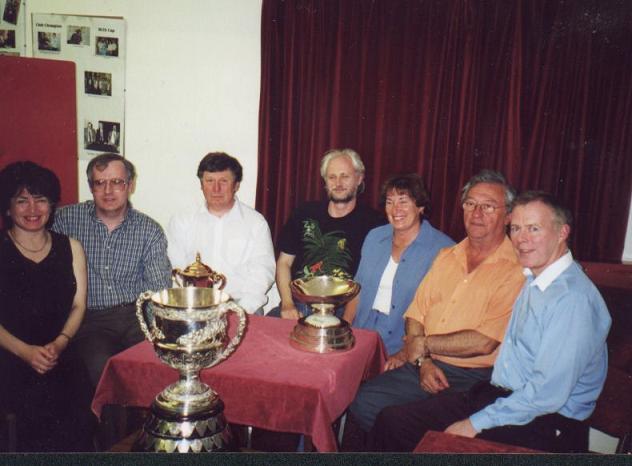 Manchester
players with the three major National Teams trophies,
Crockford's (English Teams), Gold Cup (British Teams) and
Hubert Phillips (Mixed Teams). Pictured are some of
the holders Michelle Brunner and John Holland (Crockford's);
Gary Hyett and Alan Mould (Gold Cup); Rhona and Bernard
Goldenfield (Hubert Phillips); John Hassett (Hubert Phillips
and Crockford's). Missing for the photo were Bill
Hirst (Hubert Phillips and Crockford's) and Howard Melbourne
(Gold Cup and Crockford's)
Gary Hyett and Alan Mould represented Great Britain in the European championships in 1999. Michelle Brunner and Rhona Goldenfield have represented England in the Ladies home internationals on numerous occasions. Manchester representatives in the Camrose Trophy series over the years have been Bernard Goldenfield, Denis Robson, John Holland, Boris Ewart, Gary Hyett, Alan Mould, Steve Eginton, Howard Melbourne and Michelle Brunner. The Manchester based (although affiliated to Staffs.) Hackett twins, Jason and Justin, have had phenomenal results, winning the world junior championship and Gold Cup and representing Britain in European Championships. Following the death in 1999 of Roy Higson, new trophies in his memory were obtained to replace the Infirmary Cup and Plate. During the 1980s and 1990s bridge declined in popularity and few young players were attracted to the game. By the late 1990s attendance at Manchester events had dwindled and it was decided to try to revive competitions by running a large weekend congress at a city centre hotel, something which had last been done in the 1960s. So far this has been successful, with the inaugural Millennium Congress in 2000 being repeated annually. 2001 to the present In 2001 Michelle Brunner and Rhona Goldenfield were key members of the England Ladies team which won the European Championships, they followed this up with a bronze medal in 2002. In 2001 Justin Hackett married German Women's international Barbara Stawowy. Later that year Barbara was a member of the German Women's team that won the world championships in Paris. In 2002 possibly the largest bridge event ever held in Manchester was the Commonwealth Nations Bridge Championship played just before the Commonwealth Games at the University in the Whitworth Hall. 28 nations competed with Canada, Wales and India winning Gold, Silver and Bronze respectively. The Manchester County was heavily involved in the organisation and a Manchester County team came second in the consolation event. In 2003 Gary Hyett and Alan Mould represented England in the Camrose Trophy and also in the European Open Championships to overtake the Myers brothers 33 year old record for number of times a Manchester pair has been selected for open internationals. Michelle Brunner represented England/Great Britain 40 times, twice in Open Teams, mainly in Womens events, more than 10 of them in partnership with Rhona Goldenfield. Manchester Bridge Club celebrated 25 years at its Palatine Road premises by winning the Garden Cities Trophy. Henry Huggill retired as president having been an official in Manchester since 1946. In December Manchester hosted the Camrose and Corn Cairdis matches against the Republic of Ireland winning both. Early 2004 saw the deaths of two of Manchester's longest serving and staunchest supporters, Henry Huggill and Mary Higson. Encouragingly for Manchester bridge the 21st century saw the emergence of some fine young talent in the Manchester area. Michael Byrne, Alex Morris, Mike Bell and Ed Levy (also Andrew Woodcock of Lancashire) represented England at Junior level on several occasions and had success in National and local competitions. In 2006 the Manchester team of Michelle Brunner, John Holland, Bill Hirst, John Hassett, Michael Byrne and Alex Morris came agonisingly close to becoming only the second all Manchester team to win the Gold Cup; they lost the final to a Scottish team by just 2 IMPs. Click here for reports on the 2006 Gold Cup Final BM1 BM2 BM3 BM4 BM5 BM6 In 2008 Michelle Brunner and John Holland achieved the unique feat of winning the Portland Pairs (GB Mixed Pairs) for the third time. 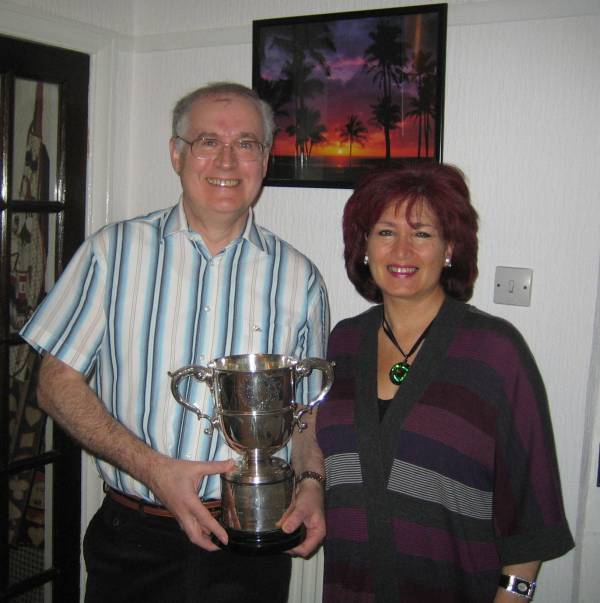 John Holland and Michelle Brunner with the Portland Trophy He followed this up with another World Championship in Philadelphia in 2010 in the Senior Open Teams. 2011
saw the end of an illustrious career when Michelle Brunner
died in June of breast cancer at the age of 57. She had
played for her country 40 times, winning World and European
Championships. She also had great success at national
level, notably winning Crockfords, the Hubert Phillips (six
times) and the Portland Pairs (three times) as well as
virtually every event at local level.
Michael Byrne has become a professional bridge player, teaching in the Manchester area as well as playing professionally and being the match secretary for the MCBA for many years. He has also been very active in coaching and captaining junior teams. He has had many successes including winning the Camrose and the Lederer with Mike Bell. Since 2008 Michael Byrne's St Titus team has been the most successful in the Manchester league, with core members being Michael Byrne, Michael Newman (until his untimely death in 2020), Gary Hyett and Rodney Lighton as well as a host of other players, notably Mike Bell, Alan Mould and John Holland. In 2013 Kevin Comrie retired as MCBA chairman having been involved in various capacities in organising bridge in the area for over 20 years. The success of the Manchester Congress has to a large extent been due to his tireless efforts. In 2015 John Holland finally (after 40 years of trying) won the Gold Cup, a well deserved success and the final major national honour to be won by Manchester's most successful player ever. Manchester had a good run in the Pachabo (inter counties teams of four) from 2014 to 2021, winning in 2015, 2018, 2019 and 2021 and finishing second in the other years (the event was not played in 2020). In the Tollemache (inter counties teams of eight) Manchester finished second six times since 2000, eventually winning in 2023. In
2019 Bernard Goldenfield one of Manchester's strongest and
most successful players died. The congress teams event
was named in his honour and a new trophy purchased.
In
2020 Michael Newman died of cancer. He won numerous
county and national events and was a regular player for the
county in the Tollemache and Northern league. A trophy
for the first division of the league was obtained in his
honour.
Falling
attendances were a problem for clubs and the county around
this time.
In
2019 Manchester Bridge Club moved from its spacious premises
on Palatine Road to rented accommodation in Fallowfield.
Jeff Morris co-owner retired and Dave Debbage continued as
manager. Dave retired at the end of 2021 and the club
became a member's club. Meanwhile the Cheadle Hulme and
Bramhall clubs merged with the joint club meeting at Bramhall.
In
2020 the Covid pandemic struck. Clubs closed
perforce. The county and some clubs were quick to move
to online bridge. This was fairly successful with
reasonable attendance at online duplicates and the Manchester
League running online albeit with a reduced number of
teams. Online bridge, which had been a fairly niche
variant became the norm for many. Gradually bridge
returned to some face to face events. Most clubs ran a
mixture of face to face and online events, as did the
county. However, overall numbers of participants
continued to fall.
References 1. Maurice Blank. Joe Lazarus Obituary. Bridge Magazine July 1981 2. Raymond Brock. Personal communication. March 2002 3. Mary Higson. Reminiscing April 2002. Acknowledgements Thanks
to Mary Higson, John Holland, Kevin Comrie, Grattan Endicott,
Sid Travers, Bernard Goldenfield, Fred Bell, Patrick Jourdain,
John Williams, Peter and Joyce Hishmurgh, Roy Dempster, Steve
Eginton, Sally and Raymond Brock, Leslie Klein, Douglas Dunn,
Alan Jones, Richard Fleet, David Franks for their help with
compiling data for this section and the honours board.
Thanks to Hilary Blank for the loan of the late Maurice Blank's collection of bridge magazines. Some data has been taken from the British Bridge Almanack by Peter Hasenson published 2004 |